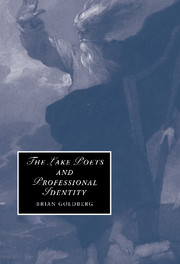Book contents
- Frontmatter
- Contents
- Acknowledgments
- Introduction: Professionalism and the Lake School of Poetry
- Part I Romanticism, risk, and professionalism
- Part II Genealogies of the romantic wanderer
- Part III Romantic itinerants
- 4 Authority and the itinerant cleric
- 5 William Cowper and the itinerant Lake poet
- Part IV The Lake school, professionalism, and the public
- Notes
- Bibliography
- Index
5 - William Cowper and the itinerant Lake poet
Published online by Cambridge University Press: 14 January 2010
- Frontmatter
- Contents
- Acknowledgments
- Introduction: Professionalism and the Lake School of Poetry
- Part I Romanticism, risk, and professionalism
- Part II Genealogies of the romantic wanderer
- Part III Romantic itinerants
- 4 Authority and the itinerant cleric
- 5 William Cowper and the itinerant Lake poet
- Part IV The Lake school, professionalism, and the public
- Notes
- Bibliography
- Index
Summary
COWPER'S PROFESSIONAL CONVERSION
In my last chapter, I discussed the Lake poets' response to the figure of the itinerant preacher. This chapter addresses a specific poetic predecessor whose involvement in evangelical religion and professional identity is especially intense. Critics have always been aware that William Cowper's experiments in informal diction and his execution of a long meditation in blank verse, The Task, make him one of the Lake poets' central influences. He also shares with them the dilemma of thwarted professional authority. Like his (and their) predecessor Young, Cowper is involved in the question of authorized and unauthorized speech, and like Young, he is particularly interested in situations that allow for extra-institutional acts of religious persuasion. Where Cowper's professional life and his literary doubles evoke a paradoxically reluctant form of such language, however, the Lake poets would discover a source of poetic and professional confidence. In a group of texts that includes Peter Bell, The Rime of the Ancient Mariner, and Madoc, the conversion experience that is persuasion's origin, and that is central to Cowper's authorial identity, is imagined as having the potential to found new institutions and new professional roles rather than subordinating itself to old ones.
At first glance, the process that goes into making a professional has little in common with the Pauline thunderbolt of religious rebirth. As we have seen, however, professional formation occurs over the course of a Humean duration that justifies the practitioner both cumulatively and at every individual moment.
- Type
- Chapter
- Information
- The Lake Poets and Professional Identity , pp. 166 - 190Publisher: Cambridge University PressPrint publication year: 2007



